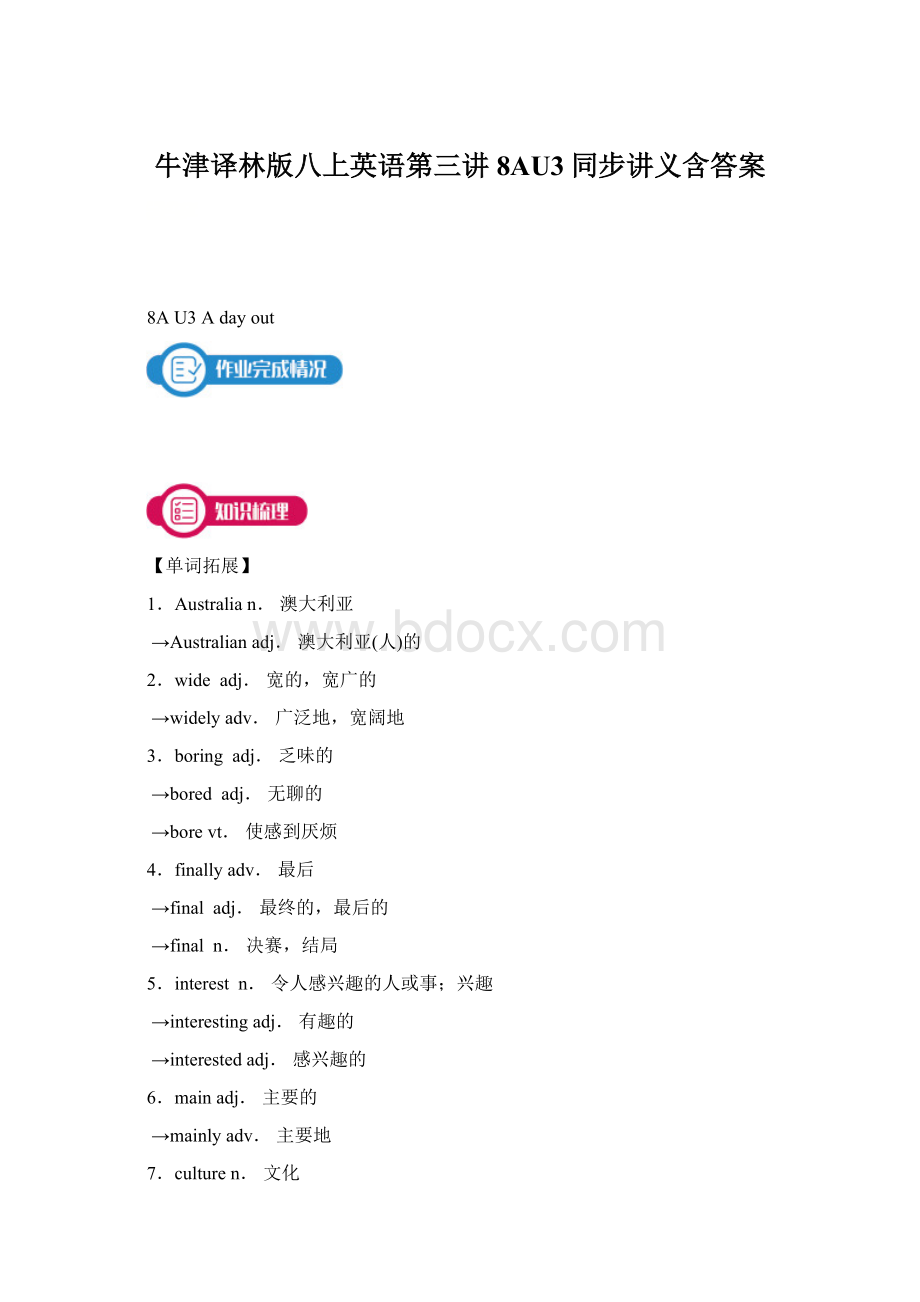牛津译林版八上英语第三讲8AU3同步讲义含答案.docx
《牛津译林版八上英语第三讲8AU3同步讲义含答案.docx》由会员分享,可在线阅读,更多相关《牛津译林版八上英语第三讲8AU3同步讲义含答案.docx(12页珍藏版)》请在冰豆网上搜索。

牛津译林版八上英语第三讲8AU3同步讲义含答案
8AU3Adayout
【单词拓展】
1.Australian.澳大利亚
→Australianadj.澳大利亚(人)的
2.wideadj.宽的,宽广的
→widelyadv.广泛地,宽阔地
3.boringadj.乏味的
→boredadj.无聊的
→borevt.使感到厌烦
4.finallyadv.最后
→finaladj.最终的,最后的
→finaln.决赛,结局
5.interestn.令人感兴趣的人或事;兴趣
→interestingadj.有趣的
→interestedadj.感兴趣的
6.mainadj.主要的
→mainlyadv.主要地
7.culturen.文化
→culturaladj.文化的
8.1uckilyadv.幸好,幸运的是
→luckyadj.幸运的
→unluckyadj.不幸的
→luckn.运气
9.climbern.登山者,攀爬者
→climbvt.&vi.爬
10.supportn.支持
→supportvt.支持
→supportern.支持者,拥护者
11.cheerv/.&vt.欢呼,喝彩
→cheern.欢呼声,喝彩声
→cheerfuladj.兴高采烈的
12.helplessadj.无助的
→helpvt.&vi.帮助
→helpn.帮助
→helpfuladj.乐于助人的
13.usefuladj.有用的,有益的
→uselessadj.无用的
→usevt.用,使用
→usen.用,用途
14.hopen.希望
→hopevt.&vi.希望
→hopefuladj.有希望的
→hopelessadj.没希望的
15.tasten.味道;品味
→tastevt.&vi.品尝
→tastyadj.美味的
16.colourfuladj.多彩的
→colourn.颜色
→colourvt.为……着色
【短语归纳】
1.keepfit保持健康
2.enjoyoneself玩得高兴,过得愉快
3.makeaplanforadaytrip制订一日游的计划
4.takeaboattrip乘船旅游
5.takecare保重
6.bemadeofsteel由钢制成
7.invitemetojointheirschooltrip
邀请我参加他们的学校旅行
8.arriveatthepark到达公园
9.can’twaittoget0ffthebus迫不及待下车
10.placesofinterest名胜
11.fromallovertheworld来自世界各地
12.ontheInternet在网上
13.putthemonhishomepage把它们放在他的主页上
14.100kateachother互相对视
15.keepthesecrettooneself保守秘密
16.getonthebus上车
17.takeplace发生,举行
18.withyoursupport在你的支持下
19.planadayout计划外出一天
20.taketheunderground乘地铁
【句型分析】
1.We’regoingtothetopoftheEiffelTowerthisafternoon!
(P31)
此句意为:
今天下午我们就要登上埃菲尔铁塔的顶部!
这是一个现在进行时态的句子,此处的aregoingto中的to是介词,用现在进行时表将来。
在英语中,go(去),come(来),arrive(到达),leave(离开),start(开始)。
return(返回)等表示“位置移动”的动词,它们的进行时态往往表示将来,含有意图、安排或打算的含义。
这种现在进行时比较生动,给人一种期待感,它常常表示最近或较近的将来。
如:
Maryisn'thereatthemoment.Sheiscominglater.
玛丽此刻不在这儿,她一会儿就来。
whenareyoustarting?
你何时动身?
TheSmithsareleavingforHongKongthisafternoon.
史密斯一家人将于今天下午动身去香港。
ThetraintoBeringisarrivingsoon.
去北京的火车很快就要到了。
2.ThebusisascomfortableasthoseintheUSA.(P35)
此句意为:
这辆公共汽车和美国的公共汽车一样舒适。
本句使用了形容词的同级比较结构,句中的those指代thebuses。
在比较状语从句中,为了避免重复,可用those代替句中前面已提到的表示复数的人或物,以避免重复使用前面的名词。
如:
Thebooksonthetablearenewerthanthoseinmyschoolbag.
桌子上的那些书比我书包里的那些新。
Theapplesonthedeskaremuchbiggerthanthoseinthebasket.
桌上的苹果比篮子里的要大得多。
3.ThemodelSydneyOperaHouselooksaswonderfulasthatinAustralia.(P35)
此句意为:
悉尼歌剧院的模型看起来与澳大利亚的那座一样棒。
本句使用了形容词的同级比较结构,句中的that指代theSydneyOperaHouse。
在比较状语从句中,为了避免重复,可用that代替句中前面已提到的表示单数的比较对象。
如:
ThepopulationofChinaislargerthanthatofCanada.
中国的人口比加拿大多。
TheweatherinBeijingismuchcolderthanthatin
Shanghaiinwinter.冬天北京的天气比上海冷得多。
4.Withyoursupport,wewillwin!
(P37)
withyoursupport在句中作状语。
句意为:
在你们的支持下我们会获胜!
此处的support作名词,意为“支持”,withone’ssupport意为“在某人的支持下”,通常在句中作状语,相当于withone’shelp/withthehelpofsomebody,意为“在某人的帮助下”,反义短语为without
one’ssupport/help,意为“没有某人的支持/帮助”。
如:
Withtheirsupport,Iwonthefirstprize.
在他们的支持下,我获得了一等奖。
WithTom’Shelp,theoldmancrossedtheroadsafely.
在汤姆的帮助下,那位老人安全地过了马路。
Withoutyoursupport,wecouldn’twin.如果没有你们的支持,我们不可能获胜。
另外,support也可用作动词,supportsomebody意为“支持某人”,supporter是名词,意为“支持者,拥护者”。
如:
Iwillsupportyouthistime.这次我将支持你。
Whoisthesupporterofyourbrother?
谁是你哥哥的支持者?
5.Wehopeyoucanjoinus.(P41)
句意为:
我们希望你能加入到我们中间。
句中的hope用作及物动词,意为“希望”,后接动词不定式或从句。
如:
Hehopestofindabetterjobinthefuture.
他希望将来能找到一个更好的工作。
Ihopeyoucangivemesomeadvice.
我希望你能给我一些建议。
注意,作简短回答时,hope后可用替代词so(肯定)或not(否定)。
如:
一Couldyoucometomybirthdayparty?
你能来参加我的生日聚会吗?
一Ihopeso.我希望如此。
在英语中,wish后面也可接动词不定式或that从句,其意义相当于“想要,希望”。
wish接that从句时一般表示某种强烈而又难以实现的“愿望”,而hope表示可以实现或能达到的“希望”。
如:
Ihope(that)itwillbesunnytomorrow.
我希望明天天气晴朗。
Iwishyousuccess.我祝你成功。
IwishIcouldflylikeabird.但愿我能像鸟一样飞。
【语法点拨】
as…as的用法
当我们要表示双方某方面(如年龄、身高等)程度相同或不同时,常用as…as或notas…as结构,表示“和……一样”或“和……不一样”。
如:
MaryisascarefulasLinda.玛丽和琳达一样仔细。
HedoesnotrunasfastasTom.他跑步没有汤姆快。
在使用同级比较时要注意以下问题:
1.as…as或notas…as属同级比较,在此结构中,要使用形容词或副词的原级。
2.在否定句中,第一个as也可换成so。
Aisnotas/so…asB意为“A不如B……”。
如:
Thisdeskisnotasheavyasthatone.这张桌子没有那张重。
=Thisdeskisnotsoheavyasthatone.
3.当我们对事物进行比较时,要注意比较的双方必须是同类事物。
如:
Herrulerisaslongasmine.
她的尺子和我的(尺子)一样长。
这句话不能说成:
Herrulerisaslongasme.
4.当as…as结构涉及数量或程度时,可用asmuch+不可数名词+as或asmany+可数名词复数+as。
如:
YoumadeasmanymistakesasIdidintheexam.
考试中你犯的错误和我犯的一样多。
HemadeasmuchmoneyasIdid.
他赚的钱和我赚的一样多。
5.as…as结构前还可加表示倍数的词。
结构为:
倍数+as+形容词或副词原级+as。
如:
Theroomistwiceaslargeasthatone.
这个房间是那个房间的两倍大。
6.我们可以将“A…+notas(so)+形容词原级+as+B’,的结构转换为比较级。
如:
TomisnotastallasMike.汤姆没有迈克高。
=MikeistallerthanTom.迈克比汤姆高。
=TomisshorterthanMike.汤姆比迈克矮。
反身代词
反身代词是代词大家庭中的小成员,但其作用却非常独特。
下面让我们一起走进反身代词的世界,共同探讨反身代词的用法。
反身代词的含义及构成:
所谓反身代词,是指人们用来反指自己的代词。
英语中的反身代词共有8个,它们有人称和数的变化。
反身代词的构成有极强的规律性:
第一、第二人称的反身代词由形容词性的物主代词加一self或一selves构成;第三人称的反身代词由人称代词的宾格加一self或一selves构
成。
见下表:
反身代词的用法:
反身代词与它所指代的一名词或代词形成互指关系,在句中常用作宾语、表语或同位语。
1.反身代词可以用作一些动词(短语)或介词的宾语,此时,句子的主语和宾语必须同一个人或物。
如:
Wemustlookafterourselvesandkeepfit.
我们必须照顾好自己,保持身体健康。
Sheoftenbuysherselfniceclothes.
她经常为自己买漂亮的衣服。
Don’tthinktoomuchofyourself!
别过多地为自己考虑!
2.反身代词在句中还可以用作主语或宾语的同位语,用来加强语气,表示“亲自、本人、本身”等意思。
但反身代词在句中不能单独作主语。
如:
Idon’tneedanyhelp.Icandoitmyself.我不需要帮助,我自己能做。
(主语的同位语)这句话不可表示成Idon’tneedanyhelp,myselfcandoit.
Ifyouwanttoknowmore,youmayaskMissWhiteherself.
如果你想了解更多情况,你可以问一问怀特小姐本人。
(宾语的同位语)
3.反身代词在句中还可以用作连系动词的表语。
如:
Thelittleboyinthephotowashimself.
照片中的那个小男孩就是他自己。
反身代词构成的固定表达:
反身代词可以与一些介词、动词搭配,构成一些十分有用的固定短语。
如:
byoneself意为“独自,凭自己”,相当于alone;enjoyoneself意为“玩得高兴,过得愉快”,相当于havefun或haveagoodtime;
helponeselfto…意为“随便吃或喝点……,随便用……";
keep…tooneself意为“不将某事说出去”;
saytooneself意为“自言自语”。
练习1
()1________ great fun it is to surf the Internet!
A. What B. What a C. How a D. How
()2. The car was running at such a high speed that the driver couldn’t ____ it and it crashed into the tree
A. save B. control C. order D. print
()3. He ________a worker in a factory, but he________ a pop star two years ago.
A. used to be; has become B. used to be; became
C. was used to be; becomes D. was used to being; has become
()4—Ann is in hospital. --- Oh, really?
—I _____know. I ________her for a long time.
A. didn’t ;will see B.don’t; will see
C. didn’t ;haven’t seen D.don’t ; haven’t seen
()5.—He is _______ in class and has _________ for two hour.
—He is so tired these days preparing for the mid-term exam.
A. asleep sleeping B. sleep; sleeping C. slept; aslee D. sleeping; been asleep
练习2
基础演练:
1. Do you know the ______(主要) idea of the article?
2 The weight of the car is about two t___________.
3 He was employed (被雇佣) _____________ (幸运) yesterday.
4 The window is made of s_______ , so it’s very strong.
5. It’s a long and boring j_____________ from the village to Xiantai by train.
巩固提高:
6. His father is going to A____________ (澳大利亚)for a trip this summer.
7. He tried to p_______ the cow out of the house.
8. Don’t take so much money. The tickets are f_______ for children.
9. Children c______________for the exciting news.
10. There are no clouds in the s_______ .
11.Hi, boys, are you interested in _____________(plan) your summer holidays?
根据汉语意思完成句子
1.李宾邀请我加入他们的学校之旅。
Li Bin ________________________________________their school trip.
2.中国有很多景点
There_______________________________________________ in China.
3. 全世界各地的人们开始自学汉语。
People from_______________________ begin to learn Chinese ___________________.
4.在不同国家旅游,我们可以学到不同的文化
Travel around different countries, and we can _________________________
5.在你们的支持下,我们一定会赢。
We must ________________________________________________.
句型转换
1 He decided to go to the island by boat.(改为同义句)
He decided to _______ a boat to the island.
2 You need to exercise. (改为否定句)
You ______ ________to exercise.
3 Skiing is dangerous. Diving is dangerous, too. (合并为一句)
Diving is ________ __________ _________ skiing.
4 We spent half an hour getting there by bus.(改为同义句)
It _________us half an hour ________ ___________ there by bus.
5Thebridgeis60feetwide.(对划线部分提问)
__________________isthebridge?
( ) 1. We took a boat trip and ________ the Opera House.
A. pass B. past C. go past D. went past
( ) 2. He always tells _______ stories to make us _______.
A. interested, laugh B. interesting, to laugh
C. interested, to laugh D. interesting, laugh
( ) 3. Old people must keep themselves ______.
A. health B. healthy C. healthily D. to be health
( ) 4. His parents were worried that he _____ too much time onchatting online.
A. spent B. cost C. paid D. had
( ) 5 No one taught ____ English. He taught ____ as he was young.
A. him; him B. him; himself C .himself; him D. himself; himself
( )6. They didn’t tell anyone else about their secret. They kept it _______.
A. to them B. for them C. to themselves D. for themselves
( )7 The desk is made _______ wood, and the books are made _______ wood, too.
A. of; of B. from; from C. of; from D. from; of
( )8 My grandfather is _______.He often exercises.
A. kind B. health C. fine D. funny
()9 His mother arrived _______ Beijing yesterday.
A. to B. at C. in D. on
( )10The roads in the town are as ___ as the ones in the city. Four cars can cross at the same time.
A. wide B. widely C. clear D. clearly